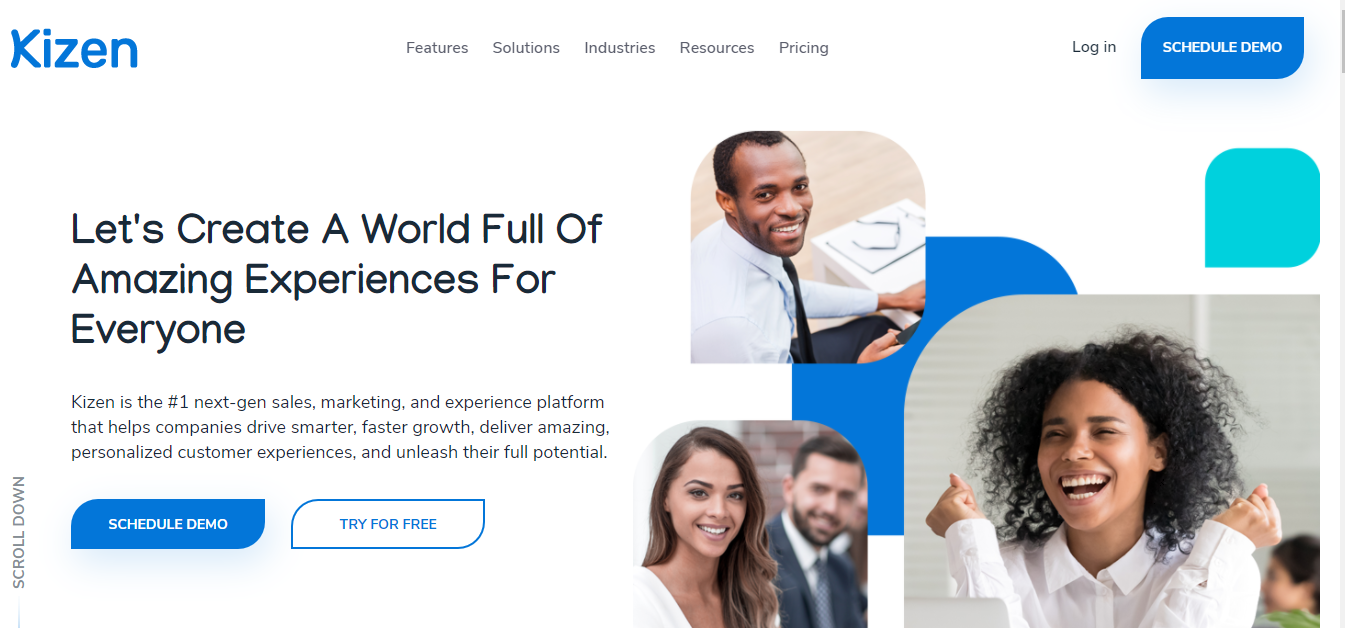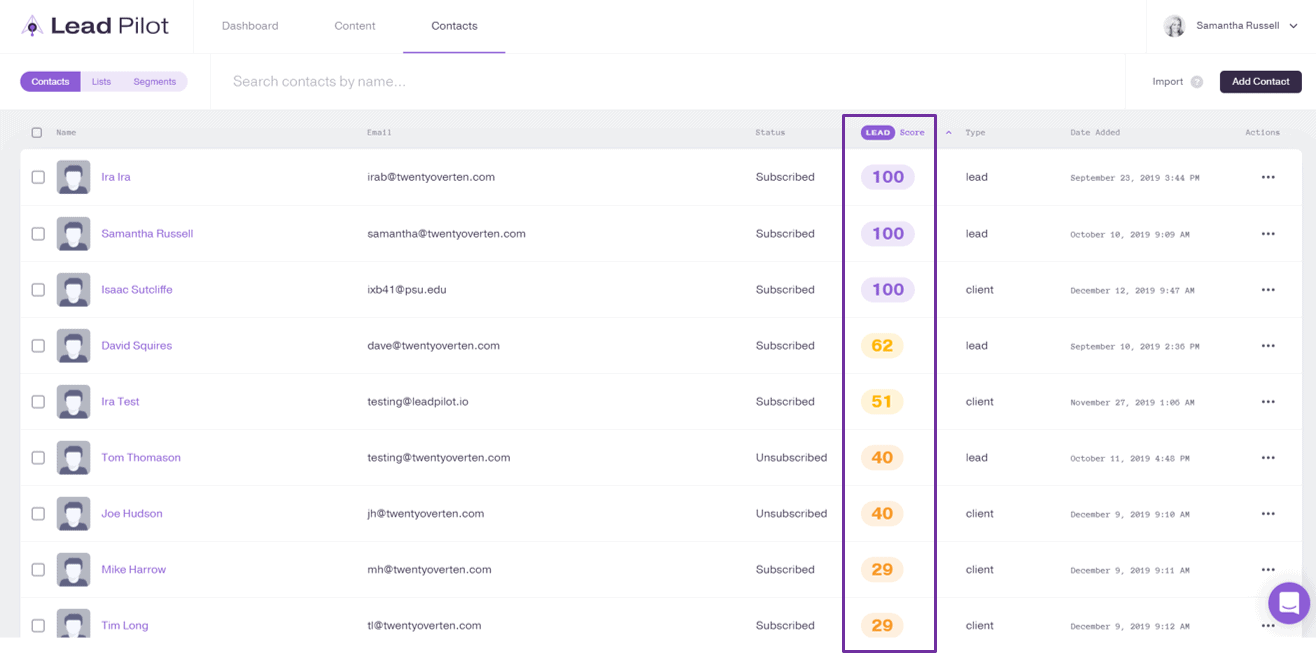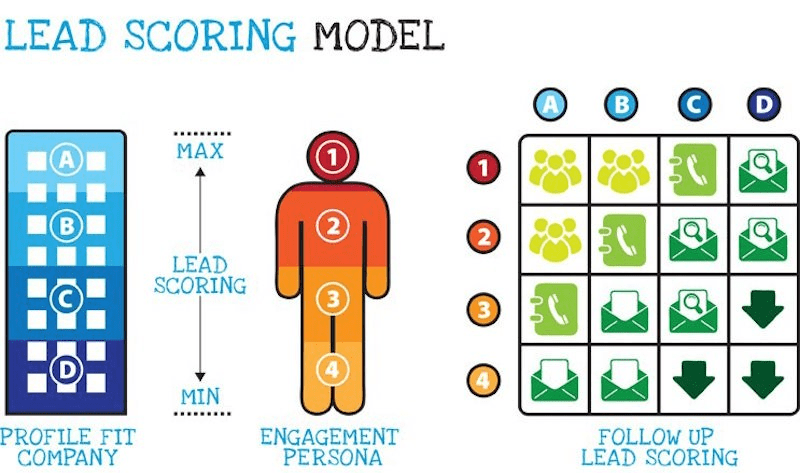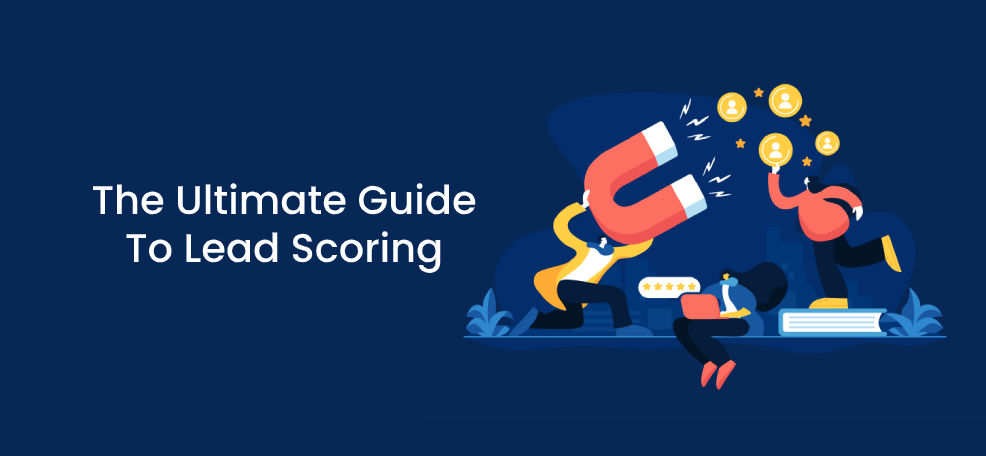Whether you are working with an in-house marketing team or outsourcing these services, the marketing professionals in your team spend much of their efforts towards creating an efficient marketing funnel.
This is the journey that potential leads will go through, from getting to know your brand to complete a purchase. The marketing funnel system is undoubtedly powerful and can increase profits and sales.
However, it can be optimized even more through the use of strategies such as lead scoring. Through lead scoring, you get to know your leads better, and you understand the probabilities of them completing a sale. In turn, this will tell you how much effort to put into attracting them!
Lead scoring models can change from business to business, but they are equally necessary when it comes down to securing more sales. Learn all about this system below.
What is Lead Scoring?

Simply put, lead scoring is a point-based system that allows you to put a score on a lead. The more interested a lead or potential customer shows in your business, the more points and higher scores they will receive.
Based on this score, the marketing team can better understand whether it is worth putting effort and resources into securing that lead. Of course, someone that shows higher interest in the service or the company will be deemed to have a higher sales potential.
You and your marketing team can find basic templates and indications for creating a lead scoring system online. However, these templates are rarely a good fit for what your business goals are.
Indeed, each business is unique, and so are its customers, leads, and marketing strategy. Therefore, your lead scoring model should be unique too, and fit the specific needs of your marketing funnel and business goals.
Lead Scoring in Business
While it is easy to understand how beneficial lead scoring can be, identifying the implications this strategy might bring into your business is even more important. Lead scoring can be defined as a marketing and sales methodology that allows you to rank leads and potential customers based on their sales-readiness.
When applying the principles of lead scoring, you will give points to your leads based on certain actions that they have taken along their journey through the sales funnel. Lead scoring also considers the current place of the lead in the buying cycle and how fitting they are for your brand.
The ranking used in lead scoring can vary. Some models use numerical points, some letters such as A, B, C, or D, some indicators such as “warm” or “cold.” Because your marketing team can focus specifically on those leads that show a higher sales-readiness, they can optimize their efforts and increase efficiency.
Some of the factors used to determine a lead’s score and fit for your brand include:
- Actions taken along the sales funnel – such as downloading materials, leaving personal details or contact information, shares/replies, and engagement.
- The interest shown – including website visits, keywords used, and email opened.
- Demographics – industry, job title, beliefs, and company size (especially for B2B)
How to Determine The Correct Lead Score

There is no fast formula you can use to start determining the correct lead score for your customers.
Of course, you will be using the methods you have implemented to give your potential customers points, attributes, or a score for each action taken when they are in the sales funnel. The more a feature they have responded to is conversion-motivated, the more points you will give that lead.
The first important step in calculating the correct lead score is to understand the features you have implemented in your sales funnel and the most effective ones. These will be the ones that will help a lead score more points!
When attempting to determine the correct lead score, you will start by understanding the minimum and maximum score to give a lead. Usually, this is between 1 and 100.
The points you will give your leads can add up because of certain actions taken. Some examples include:
- Filled out a form on your site’s landing page (20 points). This will give you access to data and details, so you can consider it a highly conversion-motivated feature. When a lead leaves their details, it means they are happy to be contacted by your company.
- Engagement with your newsletter (15 points) – This is also another high score. It means that interest in your lead is sustained throughout time, and their engagement with your company is increasing.
- Engagement on social media (5 to 10 points, depending on the action taken). A customer that follows your page or account might obtain 5 points because of their initial interest. However, if you notice that they continue to interact with your posts or through direct messages, you can increase this score to 10.
- Website or blog visits (5 points). Many potential customers might click on your blog or website, especially due to an efficient marketing strategy. However, not all of them will sustain such an interest or leave their details behind. So, just a visit or viewing might be scoring around 5 points.
Naturally, there are many more actions that a lead might be taking when in the sales funnel. This primarily depends on how your marketing team has created such a sale funnel and what they expect a lead to do while there. It might be opening an email, responding to a Call To Action, or leave their details behind.
Once you have assigned a point for each action, you can then start to track the lead’s actions through dedicated software. Now, you can easily add up the points for each action. The last step is to organize the leads based on the number of points they have received because of their actions.
Where Does Marketing Automation Come into Play?

The process described above might seem straightforward at first. However, you should also consider that your business might be seeing a great number of customers and potential leads coming through.
This is when tracking them using software and understanding their journey along the marketing funnel can become much trickier. Indeed, you will need to count the actions of every single potential customer! Of course, this is not possible, efficient, or convenient when done manually. However, it is possible to use automated marketing systems to increase the results’ precision and reliability.
Firstly, your marketing team will start by creating and setting up a model that can precisely score each lead. This is important as each model will be created specifically for a certain brand or business.
This human element that is added by the marketing team to the lead scoring system is crucial. Indeed, it allows you better to understand the journey and reactions of a potential customer.
Nonetheless, your leads will grow and will become ready to scale up. This is when automation becomes crucial. Marketing automation will be able to track each action taken by each lead, no matter how many you will receive. This automated process allows you to have better control over the score that each lead will receive.
Additionally, you can obtain better control over the leads’ journey. As soon as they reach a predetermined score, the automated system will pinpoint them and pass them over to the sales team. In this way, these particular leads will go through a customer journey created specifically for them.
An example of such a situation could be that when a specific lead reaches a certain score, it will be pushed into a specific email campaign, where they will be encouraged to try a product demo or trial. This system allows them to go through a specific touchpoint that might increase the likelihood of a sale.
How to Combine your CRM with Lead Scoring
As we have seen, it is crucial to incorporate adequate lead scoring software into your business to track a potential lead’s journey and understand the type of treatment your marketing team should reserve for them.
However, not all lead scoring software is the same or as suitable for your business. So, when selecting the right lead scoring software, you should keep in mind the importance of certain important factors, such as integration with other systems. Among these, one of the most important ones is CRM options and capabilities.
This is because of the great amount of data and information a CRM software can communicate to a lead scoring software. Indeed, CRM software will gather and store historical data, behavioral test patterns, and databases. When your lead scoring marketing has access to such an impressive amount of data, it can start adjusting scores and create more precise outcomes.
If you have opted for software that uniquely focuses on lead scoring, you should ensure that it has access to your CRM software.
What is CRM?
CRM (Customer Relationship Management) is a system that allows businesses and companies to manage each interaction with their audience. Because of the software used, data, behavioral patterns, and other useful details are saved along the way. In turn, this data is often used to streamline the sales journey, productivity, efficiency, and future projects.
An efficient CRM software is at the core of adequately using the data gathered from your audience to create more suitable and attractive products. It is also important to increase the business sustainability in the long term.
How to Combine It With Lead Scoring
When looking for software that can help you refine your customer relationship management and obtain more precise lead scoring results, there are a few on the market that might be suitable for your business. Check some of them out below:
-
Ontraport

Ontraport is a scalable platform that helps you keep all the data gathered through CRM in one place. Because of this, you can obtain a clearer idea of where a certain lead is along the funnel journey and what to expect from them. In turn, you can also act faster when they reach a certain score, knowing exactly how to bring them through the next touchpoint. The platform also includes some special features such as powerful marketing automation and website page results.
-
Outfunnel

Outfunnel is a software dedicated to all businesses, from smaller ones to larger enterprises. Because of its extended functionalities, Outfunnel is perfect to create a customized email marketing campaign or integrate the data from your CRM into your lead scoring system.
The software will also pinpoint those sales-ready leads and pull up the range of information gathered about them. So you know exactly what the next step should be!
-
Keap

When trying to convert interest into a sale, there is no room for error. Indeed, a wrong email or a repetitive message can give away the wrong indications, causing a lead to drop out of your sales funnel. Keap understands this.
That is why you can use its functionalities to integrate CRM data with lead scoring capabilities. In turn, this allows you to know when is the right time to send a marketing email or encourage a lead towards the next step. The software allows you to keep track of all the actions that have been taken towards converting that lead and at what stage they are in their sales journey.
-
Kizen

Kizen is a platform that focuses uniquely on the customer experience when they approach your brand. Because of this, you will have access to a series of functionalities and unique features that will grant you better control over the personalized customer experience your audience goes through.
Types of Lead Scoring Models
It is possible to find some lead scoring models online. However, it is crucial to keep in mind that they should be modeled for each specific business.
Therefore, it can be hard to copy another business’s model. This is because each business implements a unique marketing strategy and sales funnel. These will cause the customer to go through a unique journey each time.
Below, you can find some models that can help you find inspiration when creating your own.
Lead Pilot

Lead Pilot is a software for lead scoring created with the needs of financial advisors in mind. While it boasts its own lead scoring, too, it does much more than that. Indeed, it can help create marketing campaigns, analyze your customer data, and design more effective customer journeys.
This is also one of the simplest lead scoring software, and it works by assigning each customer a score of 1 to 100. Because everything is automated, you can see the score and leaderboard of each lead updating automatically and in real-time each time they complete an action.
Each action along the sales funnel has predetermined scores that can be changed to adapt better to your business’s needs.
Juan Merodio

Juan Merodio is a different type of lead scoring system compared to the ones we have seen above. Indeed, it uses a matrix to determine the score of each lead. On the matrix, you will find two different types of scores:
- The PAIN score – this represents how intense or big the problem that the customer is facing is. This is also referred to as the pain point. If a customer has just a mild problem that is not pressing, they will be assigned a low score, closer to 1. If the problem needs an immediate solution, they will get a higher score, closer to 10.
- The FIT score – this score represents how close a customer feels or is to your company, based on value and the buyer persona you have built.
When these scores are plotted into a matrix, you can see whether a lead is ready for sales or not as interested.
Business2Community
Business2Community has a unique lead scoring system that is simple to use and designed for B2B businesses. This system is based on a simple matrix. When plotting each lead into the matrix, you will just need to ask four questions (job title, department, company type, and company size). Compare the answers to your customer persona, and, depending on the answers obtained, you will assign one of four scores to the lead. These include:
- Best answer received: 4 points
- 2nd Best Answer: 3 points
- 3rd Best Answer: 4 points
- Negative Answer: Negative points
You can then add up the answer to each question and obtain your lead score.
What is Predictive Lead Scoring?
When trying to determine the correct lead score, there are some steps each company has to take. Firstly, you will need to examine your sales funnel. You will then need to design a customized lead scoring system and enhance the collaboration between your marketing and sales departments.
However, once all this is done and working correctly, you should move onto predictive lead scoring. This type of system is powered by Artificial Intelligence (AI) and allows you to speed up and optimize the sales process. Predictive lead scoring aims to predict when a customer will conclude a purchase and whether they are a fit for your brand from the initial steps.
You might already be doing all this manually! If your marketing team uses historical data and customer persona to determine who the potential customer to put more effort towards, you are also predicting your leads’ scores. However, once you have started to receive an increased number of leads, AI can help you automate all this and offer you more precise results.
How to Apply Lead Scoring To Your Business
When applying lead scoring to your business, it is crucial to start by understanding who your customer persona is. Once you have done so and have a clear idea of what your sales funnel looks like, you might start determining the type of customer journey your leads should go through.
Lead scoring can be done automatically by certain CRM systems or specialized software. It does not require major investments of budget and resources, but it can yield impressive benefits, including:
- Increased sales efficiency – lead scoring tells you when a lead is ready for a purchase, so your sales department won’t have to focus on leads that might not conclude in a sale.
- Increased marketing efficiency – lead scoring can help understand the return on investment on your marketing efforts.
- Improved collaboration between sales and marketing department – lead scoring allows you to streamline the two departments’ cooperation and work to obtain more valuable insights.
- Increased revenue – lead scoring allows you to focus your effort on a specific portion of the market and your audience, limiting expenses, and improving revenue.
Lead scoring is a great way to figure out which leads to focus your efforts on. Once you select the scoring model that works for you and apply it to your business correctly, you won’t go back. With the many benefits that lead scoring offers, there’s no reason not to use it today.
Author’s Bio

Yash Chawlani
He is a Digital Marketing Specialist who has gained significant experience working as a freelancer for Industry regulars. He specializes in SEO, Link Building, Social Media Optimization, and Content Marketing. You can connect with him on Twitter.




